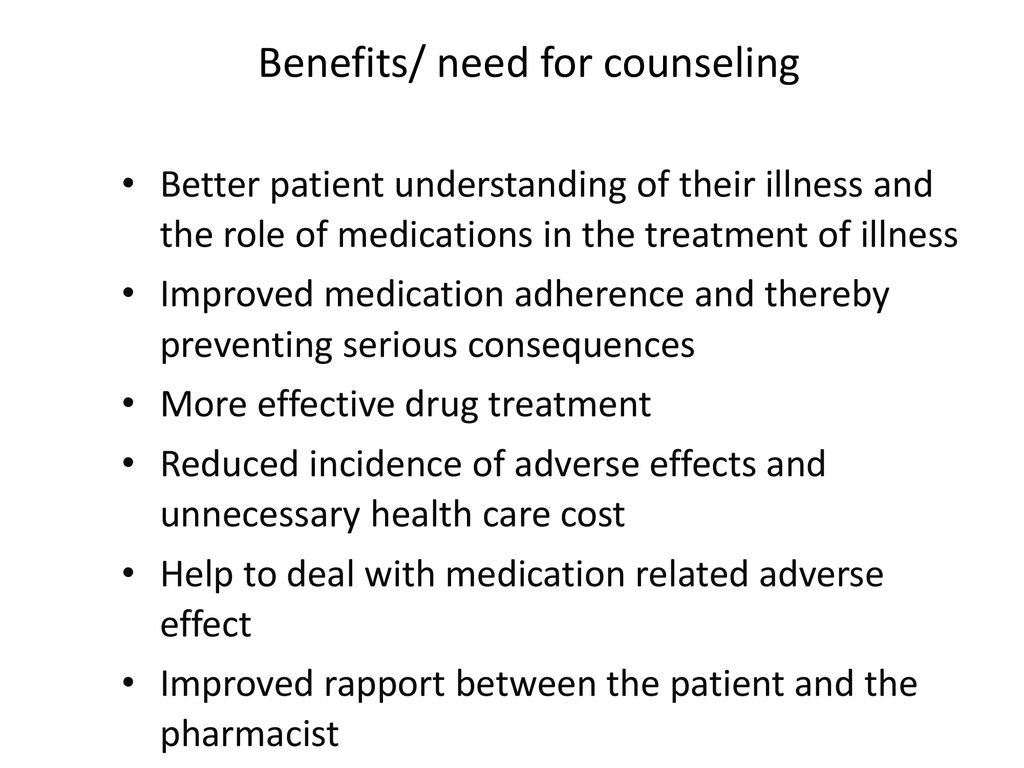
Effective patient counselling by pharmacists on proper use of medications can positively impact the therapeutic outcome. This is possible when all important information about the medicine is exchanged in an appropriate and timely manner with an open, unhurried and relaxed attitude. Giving adequate time for each patient is essential to effective patient counselling.
PATIENT COUNSELLING:
Essential components of an effective patient counselling include:
- assessing the understanding of patient about the medication,
- considering previous history of allergy and contraindications to the medication,
- discussing the dose of the medication and how often it should be taken, what to do if a dose is missed and educating the patient on potential problems of non-adherence.
The patient must be educated about proper storage of the medicine and disposal of unused medicines. Possible drug-drug or drug-food interactions of both prescription medicines and over-the-counter medicines used by the patient must be screened and resolved. Interaction of the medicine with alcohol must be evaluated and appropriate advice must be given. Specific precaution for elderly, pediatric, pregnant and breast feeding patients or any other medicine related precautions have to be discussed. The patient must be advised to avoid sunlight if the medicine is photosensitive. Educate the patient about possible side effects of the medication. and advice the patient to report to the prescriber in case of any suspected adverse effects.
ADVANTAGES:
Effective patient counselling not only facilitates patient education but also promotes medication adherence and reduce medication-related problems. Pharmacists need to possess both knowledge on current pharmacotherapy and skill to provide accurate medication counselling.

Teaching aids like pictures, models, audio visual resources, memory aids, written materials, placebo devices and medication counselling guides may be used by the pharmacists in order to share the information with patients. The ability to communicate effectively with patients is an important skill necessary for accurate patient medication history interview, appropriate decisions and contributes to patient’s interest and adherence to therapy. Essential verbal communication skills required for a pharmacist include the ability to listen, understand, and respond to what patient says and the ability to interpret nonverbal communication and respond to patients in a way that encourages continued interaction. Active listening is the key skill required in patient counselling.
WHAT NEEDS TO BE DONE:
As pointed out by the World Health Organization, community pharmacists are the most accessible healthcare professionals to the public. Pharmacy practice in community pharmacies in India is moving towards a new paradigm that integrates drug delivery and patient-centered care.
Common physical barriers encountered in community pharmacies include large countertops, display areas, protective glass in the dispensing area, and elevated pharmacy work area.
Lack of privacy is a common problem in most pharmacies. Exchange of health information at the point of dispensing may result in breach of patient privacy and incomplete and inaccurate information from the patient. Therefore, it is important to create a sense of privacy (visual and auditory privacy) by setting up a specially designated area in the pharmacy for patient counselling.
The environment of the patient counselling area should facilitate patient participation and learning and encourage the establishment of a caring relationship between the pharmacist and the patient.

The pharmacist should show sincere respect to the patient and not discriminate against the particular qualities of the patient such as smoking, excessive alcohol consumption, non compliance with prescribed medications, obesity and poor hygiene.
Pharmacist may introduce himself/herself first, obtain permission to interact with the patient and explain the purpose of the interaction. By controlling the types of questions asked, the pharmacist can better manage patient pharmacist interaction throughout the session. The educational background and emotional state of the patient should be considered before starting the session. Important information about medicine allergies, non-prescription medicines and alternative medicines use, medication adherence behavior of the patient etc. are obtained during the interaction.
Initially more open-ended questions may be asked, followed by structured and directed questions. Patients should be given multiple opportunities to ask questions during communication. After the information is provided, the session should conclude by summarizing the points, determining the depth of the patient’s understanding, and retaining the information through feedback. Over time, by providing large amounts of drug specific information, pharmacists can help the patient successfully manage drug therapy.

PHARMACISTS:
Welfare of humanity is the basis of ethical pharmacy behavior. While the preservation of confidential information related to the health condition and medical treatment is a basic right of the patient, it is also the ethical obligation upon the pharmacist who is counselling the patient. Thus, confidentiality of patient information is not only the ethical responsibility of pharmacist but an indication of respect for moral right of the patient for privacy. Therefore, confidentiality is both an ethical consideration and an important element of patient counselling. It also encourages patients to trust their pharmacists.
In addition to extensive knowledge of various medications, pharmacists must have a range of essential counselling qualities such as sincerity, caring, warmth through body language and words, deep empathy, and respect for the patient as a unique human being. Empathy is communicated non-verbally through facial expression, eye-contact, leaning forward and reducing physical distance. Empathy is a skill that pharmacists can develop.
Patient counselling by pharmacists touches the human life more closely than any other helping relationship. However, patient counselling requires extensive training, supervised practice and a high level of professionalism. Fortunately, effective patient counselling can be learned and practiced. Moreover, a standardized evaluation tool that helps to evaluate all aspects of medication counselling by the pharmacist is the need of the hour.




